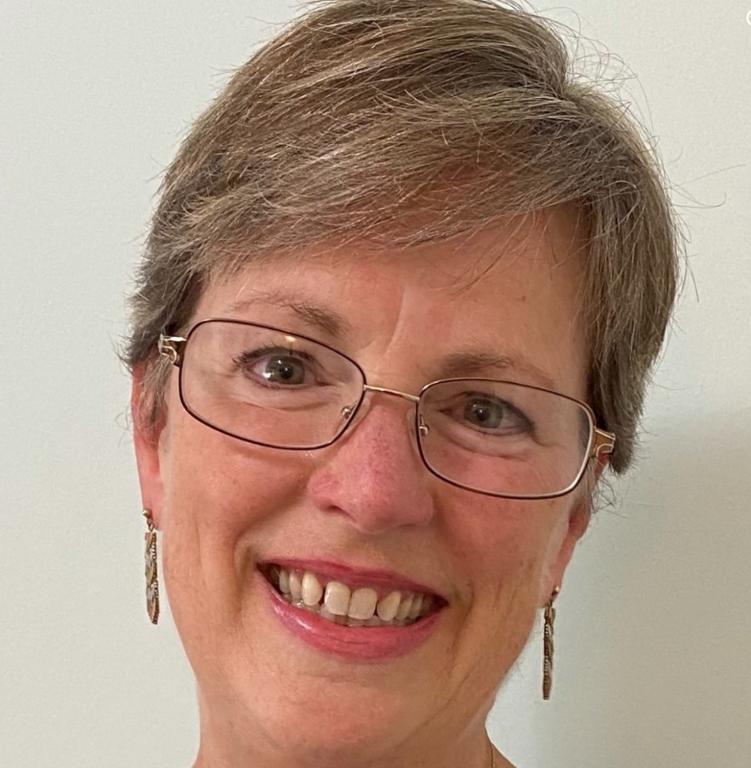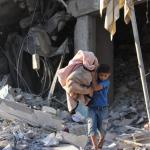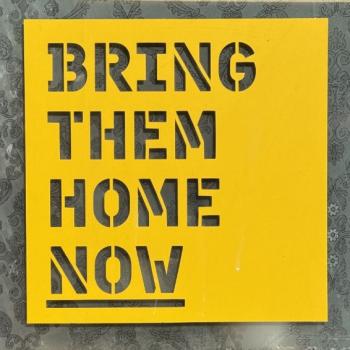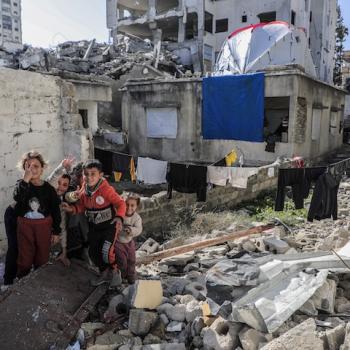I met the Rev. Dr. Mitri Raheb during a visit to Bethlehem in 2013. At that time, he was pastoring Christmas Lutheran Church, and we talked a bit after the service. I’ve been fortunate to get to know Mitri since then on some of his many visits to the US. He is the Founder and President of Dar al-Kalima University College of Arts and Culture in Bethlehem in the occupied West Bank, as well as a prolific author and compelling speaker. He has since retired from parish ministry and spends his time declaring the gospel of liberation and advocating for a just peace in Palestine.
(I heartily recommend all of Mitri’s books – especially Decolonizing Palestine: the Land, the People, the Bible.)
Dr. Raheb recently described an experience he had – and the important lesson it taught him. We need to learn this lesson too.
A few days ago, Dr. Raheb was taking care of day-to-day business when he got a startling phone message. As he tells the story,
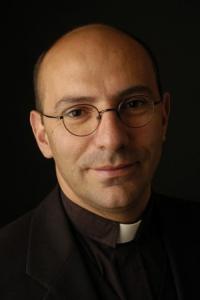
Suddenly, I receive a message from a friend in Gaza that an Israeli airstrike has hit the campus of the Greek Orthodox Church in the old city of Gaza, and that at least one child is killed in the attack. Israel did not spare hospitals, cultural centers, housing units, or mosques in its war, and now it hit one of the oldest churches in Palestine.
Many thoughts started crossing my mind, many images of the members of the Gazan Christian community that I came to know during my many visits to Gaza during the last five years. [NOTE: yes, there are Christians in Gaza.]
I called a friend, a Palestinian Christian journalist in Gaza that took refuge with his wife, three daughters, and in-laws at the Roman Catholic Church. I knew that his brother has taken refuge with his family at the Greek-Orthodox Church. I called him and he answered immediately telling me: “Pastor, they have bombed the assembly hall of the Greek-Orthodox Church. We do not know yet the exact number of casualties.” “Is your brother safe?’, I asked.
“Yes, thank God; he was staying with his family on the other side of the compound,” he answered.
Suddenly, we heard someone shouting and crying aloud. “What’s the matter, sister?” my friend asked.
“The assembly hall of the Greek-Orthodox Church is totally destroyed; they believe all 40 people who were staying there are killed.” She added, “if they bombed the Greek-Orthodox Church, then nothing will deter them for bombing our church here. We are next!”
My friend gave his mobile to the sister, saying, “here is Rev. Mitri Raheb, talk to him.”
“I can’t talk, this is terrifying, I can’t believe what is happening,” she said. Then she took the phone, she was still crying.
At that moment, I wished that he did not ask her to talk with me. This was one of the few moments in my entire life when I was speechless; I did not know what to say, what to tell her. Every word will be out of place. Yet, I had to say something.
The only words that came to mind were: “We pray for you all.” I thought that these words would calm a sister who dedicated her life for Christ and for a life in prayer.
To my surprise, she shouted while crying “We don’t need prayers!” and handed the mobile back to my friend. Her words are still ringing in my ears.
“We do not need prayers.” I was meditating on her words for hours. Why would a sister say something like this. We all appreciate hearing friends telling us that they keep us in their thoughts and prayers. During these last days, I received hundreds of emails from friends who wanted to reach out to tell us that they are thinking of us now, and that they are praying for our safety. I appreciate all these messages.
So, why was the sister annoyed when I told her that we are praying for them in Gaza. I am sure that at that critical moment my words sounded like a clichéd, “cheap” answer that does not correspond to the gravity of the situation.
Yet, the more I thought about it, the more I started understanding her answer.
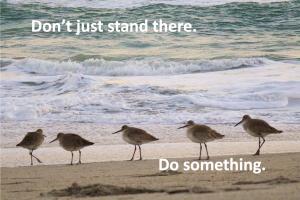
Getting real
In this context of a war crime, committed against the civilian population in Gaza, what is needed is more than prayer; what is needed is advocacy, what is needed is political action, what is needed is for people to go on the streets demanding an end to this aggression.
She knew that without an immediate ceasefire, without swift access to food, water, and medicine, and without a just and lasting peace, neither she nor her community would survive this war.
Yet, her words were not just about fearing for her life and for the people in Gaza. Her words, in that moment, had something prophetic in them.
“Stop praying for Gaza, while allowing your government to sanction war. Stop thinking you are doing the people in Gaza a favor by praying without working vehemently for justice.”
Her prophetic words reminded me of the words of the prophet Amos:
I hate, I despise your feast days,
And I do not savor your sacred assemblies.
Though you offer Me burnt offerings and your grain offerings,
I will not accept them,
Nor will I regard your fattened peace offerings.Take away from Me the noise of your songs,
For I will not hear the melody of your stringed instruments.
But let justice run down like water,
And righteousness like a mighty stream.
Mitri is absolutely right – and if he can learn something new after decades of preaching and teaching God’s Word, we can too. We can change our approach, not just to Gaza, but to prayer in general.
No more “Pray and walk away.”
No more “We’ll pray. It’s the least we can do.” (We should strive to do more than the least we can do.)
We need to get off our knees and use our legs – like Frederick Douglass did. He prayed for twenty years to be freed from slavery, “but got no answer till I prayed with my legs.”
Some things are outside our control – the situation in Gaza is not one of those things.
To-Do list – after you pray
Contact your Congress members and tell them: CEASEFIRE NOW. THEN JUSTICE. THEN PEACE. Without the first two, there will be no peace. Tweet your Congress members.
Invite some friends over and watch this video (spoiler: it’s me!), or any of a number of other videos (I’ll post some on Facebook) that will help you get more familiar with the facts and the context of this conflict.
Read any articles from Grace Colored Glasses’ Palestine and Israel archive, or other trustworthy sources (I can personally recommend this, this, and this).
Find a rally near you and attend. Hundreds of thousands of Americans – and millions around the world – are demonstrating for peace and justice for Gaza.
If you’re the organizing type, here is help with planning your own event.
Whatever you choose, pray with your legs!
I invite you to subscribe to my newsletter. I write about the Palestine-Israel issue regularly, and other issues relevant to progressives or those considering becoming progressive. If you would like to comment on this post, please pop over to my Facebook page. All of my posts are there and open to constructive comment. I welcome your thoughts.
- Christians: Why do we skimp on compassion when it comes to Palestinians?
- Advice to the Church: Gaza is the hill you should be ready die on
- How to make sense of the Palestinian call for freedom and justice
- Don’t compromise truth on Israel and Palestine
- What People Of Faith Need To Know About Gaza And Israel Right Now
- In Gaza, she now inhabits a solitary space between life and death
- Update from loved ones – this is what it’s like to be alive in Gaza right now
- In recordbreaking heat, Israel intentionally impedes Palestinian families’ access to water
- Terror attack on Church of Gethsemane, Jerusalem


